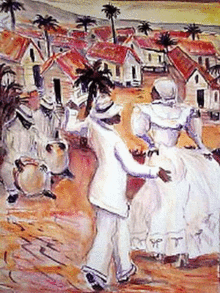
Back بومبا (رقصه) ARZ Bomba (música) Spanish Bomba French Bomba (xénero musical) Galician Bomba (musica) Italian Bomba (gênero musical) Portuguese
| Bomba | |
|---|---|
 Dancing bomba and plena | |
| Stylistic origins | |
| Cultural origins | 17th century, Puerto Rico |
| Typical instruments | |
| Other topics | |
| Music of Puerto Rico | |
Bomba is an umbrella term that refers to a variety of musical styles and associated dances originating in Puerto Rico.[1] It was developed by enslaved Africans and their descendants in sugar plantations along coastal towns, most notably Loiza, Mayagüez, Ponce, and San Juan, during the 17th century. It is the island's oldest musical tradition.[2][3][4][5]
Bomba reflects a syncretism of Puerto Rico’s many cultural groups. It incorporates Taíno instruments such as the maraca; characteristics from traditional European dances like rigadoons, quadrilles and mazurkas; and drum ensembles and drummer/dancer interaction that bear close resemblance to a number of West African musical styles.[6][2][7] The music also evolved through contact between enslaved populations from different Caribbean colonies and regions, including the Dutch colonies, Cuba, Santo Domingo, and Haiti.[8][9]
- ^ Cite error: The named reference
Smithsonian - Los Pleneroswas invoked but never defined (see the help page). - ^ a b Ferreras, S. E. (2005). Solo drumming in the Puerto Rican bomba: An analysis of musical processes and improvisational strategies (thesis). Online
- ^ "Bomba Landscapes: The Flow of People, Technology, and the Music Industry". Smithsonian Folkways Recordings. Retrieved 2024-01-11.
- ^ "Bomba: The Sound of Puerto Rico's African Heritage - NAfME". nafme.org/. Retrieved 2024-01-11.
- ^ Cite error: The named reference
NYT 2018was invoked but never defined (see the help page). - ^ "Wooden one-piece maraca, Taíno culture (11th - 15th centuries)". International Council of Museums. Retrieved 2024-01-11.
- ^ Vega Drouet, Hector (1979). Historical and Ethnological Survey on the Probable African Origins of the Puerto Rican Bomba (thesis).
- ^ Cite error: The named reference
Smithsonian Folkways Recordings 2009was invoked but never defined (see the help page). - ^ Rivera, Raquel Z. (2010), Diouf, Mamadou; Nwankwo, Ifeoma Kiddoe (eds.), "New York Bomba: Puerto Ricans, Dominicans, and a Bridge Called Haiti", Rhythms of the Afro-Atlantic World, Rituals and Remembrances, University of Michigan Press, pp. 178–199, ISBN 978-0-472-07096-1, retrieved 2024-01-17
© MMXXIII Rich X Search. We shall prevail. All rights reserved. Rich X Search